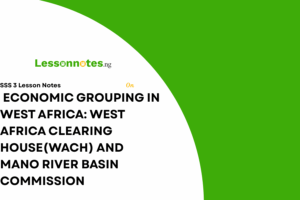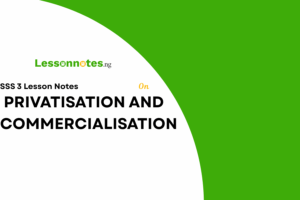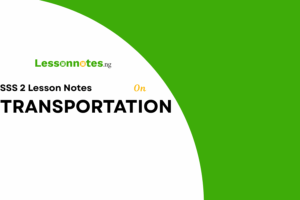Economic Grouping in West Africa – (ECOWAS) & Niger Basin Commission SS3 Commerce Lesson Note
Download Lesson NoteTopic: Economic Grouping in West Africa – (ECOWAS) & Niger Basin Commission
MEANING: Economic grouping may be defined as the coming together of different countries with a common economic interest and goals to promote economic cooperation and development among member states, protect and promote the economic and business interests of members as well as stimulating the socio-economic, cultural development and cooperation among its members.
ECONOMIC COMMUNITY OF WEST AFRICA STATES (ECOWAS) FORMATION: The Economic Community of West African States (ECOWAS) was formed purposely to promote cooperation, development and economic integration of the West African sub-region. A step towards the establishment of (ECOWAS) was taken with the agreement in May. 1975 to set up an economic grouping in the West African sub-region. The idea was supported by the then Nigeria head of state and the Togolese president. The aim is not only for the expansion of trade within the sub-region but also for cooperation in other areas, e.g. communication, and culture.
On 28 May 1975, the representatives of fifteen West African nations signed the treaty establishing ECOWAS with headquarters in Lagos, Nigeria while the seat of operation of the fund was in Lome, Togo. Later, the economic community admitted Cape Verde as the 16th member. Meanwhile, Mauritania opted out of ECOWAS in the year 2000.
ECOWAS MEMBER COUNTRIES
- Nigeria
- Ghana
- Senegal
- Niger Republic
- Burkina Faso
- Cape Verde
- Benin Republic
- Côte d’ Ivoire
- Liberia
- Togo
- Mali
- Guinea Bissau
- Sierra Leone
- The Gambia
- Guinea
AIMS AND OBJECTIVES OF ECOWAS
- To expand trade among countries by widening the markets in the region.
- To improve the transport and communication system, i.e. infrastructural facilities.
- To ensure free movement of factors of production to member states by removing every obstacle
- To promote economic cooperation and development in the fields of industry, agriculture, science etc.
- To maintain economic and political stability in the sub region
- To harmonise the agricultural policies and to promote joint projects in the area of research
- To foster closer relations among member countries.
- To contribute to the industrial development of West Africa as a whole
- To harmonise monetary policies among its members
- To establish a common fund for cooperation compensation and development
- To abolish tariffs and other restrictions on the movement of goods and services within the sub-region.
- . To promote sporting activities in sub-region
- To settle disputes among its members
- To set up a military body that will maintain peace in the sub-region, e.g. ECOMOG ORGANS OF ECOWAS
The Agreement Establishing ECOWAS Provided for the Following Organs.
- THE AUTHORITY OF HEADS OF STATES: The authority of heads of state and governments is made up of all the presidents of the 16 member countries. This organ is the main decision-making body.
- THE COUNCIL OF MINISTER: The council of ministers is made up of two representatives from each country. They monitor the functioning and development of the community and make recommendations to the heads of state. They are responsible for implementing the decisions of the heads of state.
- THE EXECUTIVE SECRETARIAT: The executive secretariat located in Lagos performs the administrative functions of the community.
- TECHNICAL AND SPECIALISED COMMISSION: Four technical and specialised commissions were established to submit reports and recommendations to the council of ministers. These are defence, social and cultural, industry and agriculture, trade and customs and monitoring commissions.
PROBLEMS OF ECOWAS
- Fear of Domination: The members are afraid of each other because of uneven development in Region
- Different Currencies: The existence of different currencies in the sub-region has greatly reduced trading activities among member states, for instance, the transfer of money is difficult.
- Political and ideological differences: The countries in the region are divided along political ideologies. Some of these countries practise capitalism while others adopt socialist economies.
- Political Instability: Constant changes in government as a result of coups have led to political instability in the sub-region, and this has adversely affected ECOWAS.
- Colonial Ties: The region is divided into French-speaking and English-speaking according to their former colonial linkage, and this has weakened the unity of the community.
- Irregular Financial Contribution of Members: Another problem of ECOWAS is the problem of funds; member countries have not been honouring their financial contribution to the community. They do not contribute regularly to the community’s fund.
- Failure of members to implement resolutions: Members of ECOWAS have failed to implement some of the resolutions passed by the community as these resolutions are not binding on the countries.
- Lack of infrastructural facilities: The lack of social amenities in the sub-region has greatly hindered the attainment of the aims and objectives of the community. Many countries in the sub-region have inefficient trade.
NIGER BASIN COMMISSION (NBC) FORMATION: The Niger Basin Commission (NBC) was established by countries located in the Niger Basin to maintain better cooperation on the use of River Niger. The treaty establishing the commission was signed by the countries in October 1963. These countries are The Republic of Benin, Chad, Cameroun, Guinea, Burkina Faso, Nigeria, Mali, Cote de Ivoire and Niger Republic. River Niger is one of the longest and largest rivers in the world. It flows through many countries of the West African sub-region. The headquarters of the commission is located in Niamey, Niger Republic.
AIMS AND OBJECTIVES OF THE COMMISSION:
- To guide navigations on the Niger River.
- To ensure the most effective utilisation of the resources of the river.
- To streamline the construction of dams on the Niger
- To ensure the most effective use of the Niger water
- To undertake schemes to control floods and erosion
- To promote studies on the agricultural potentials of the River Niger



















